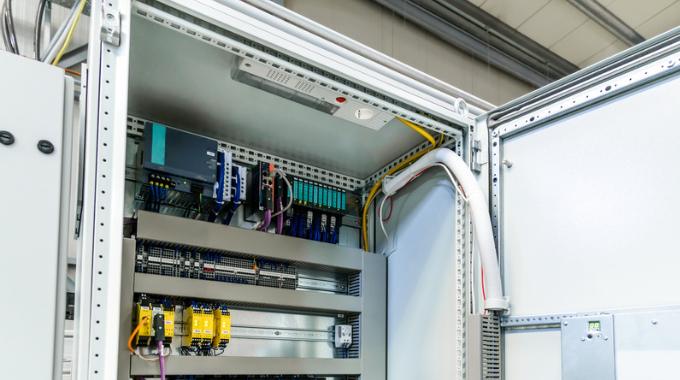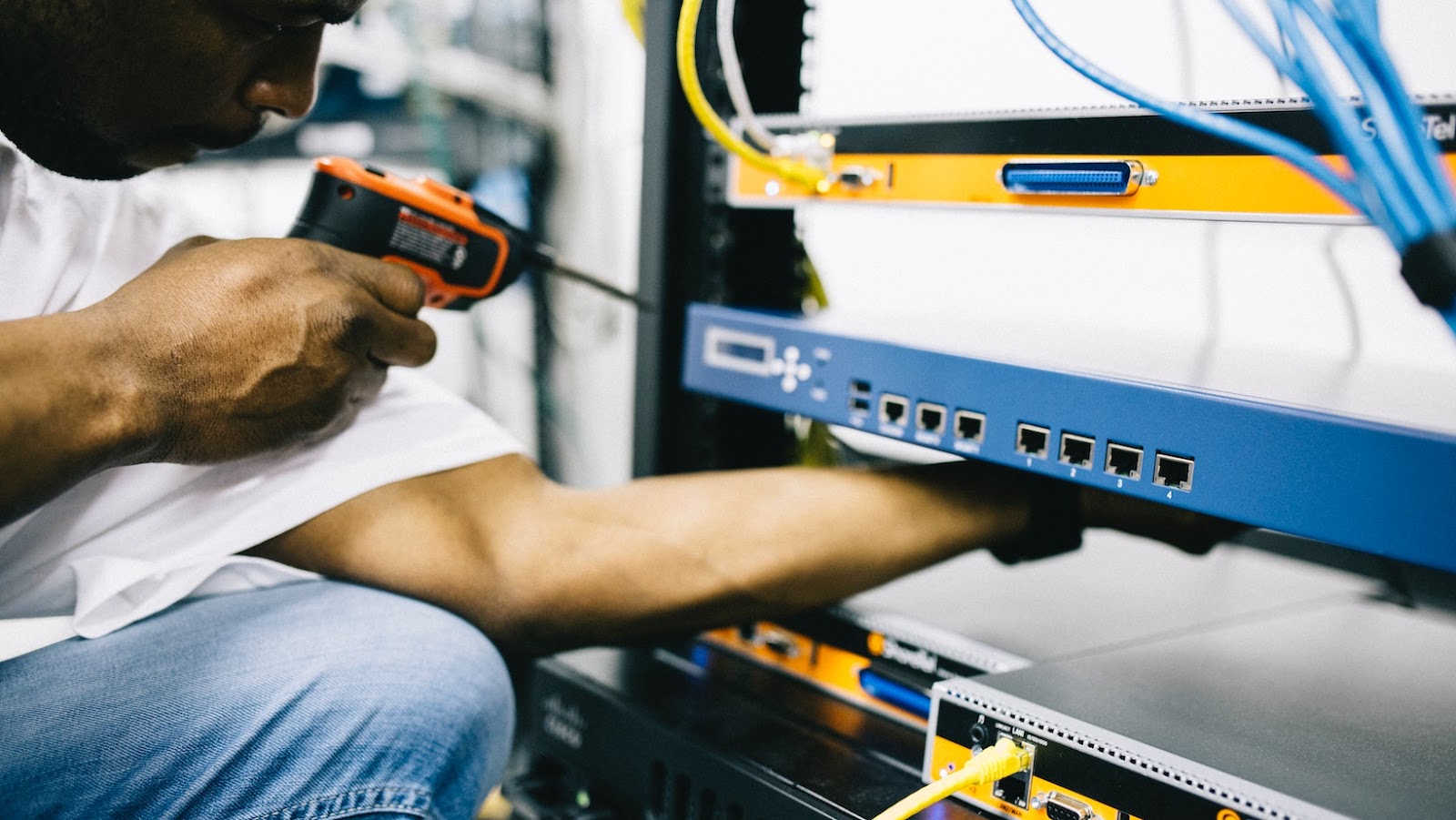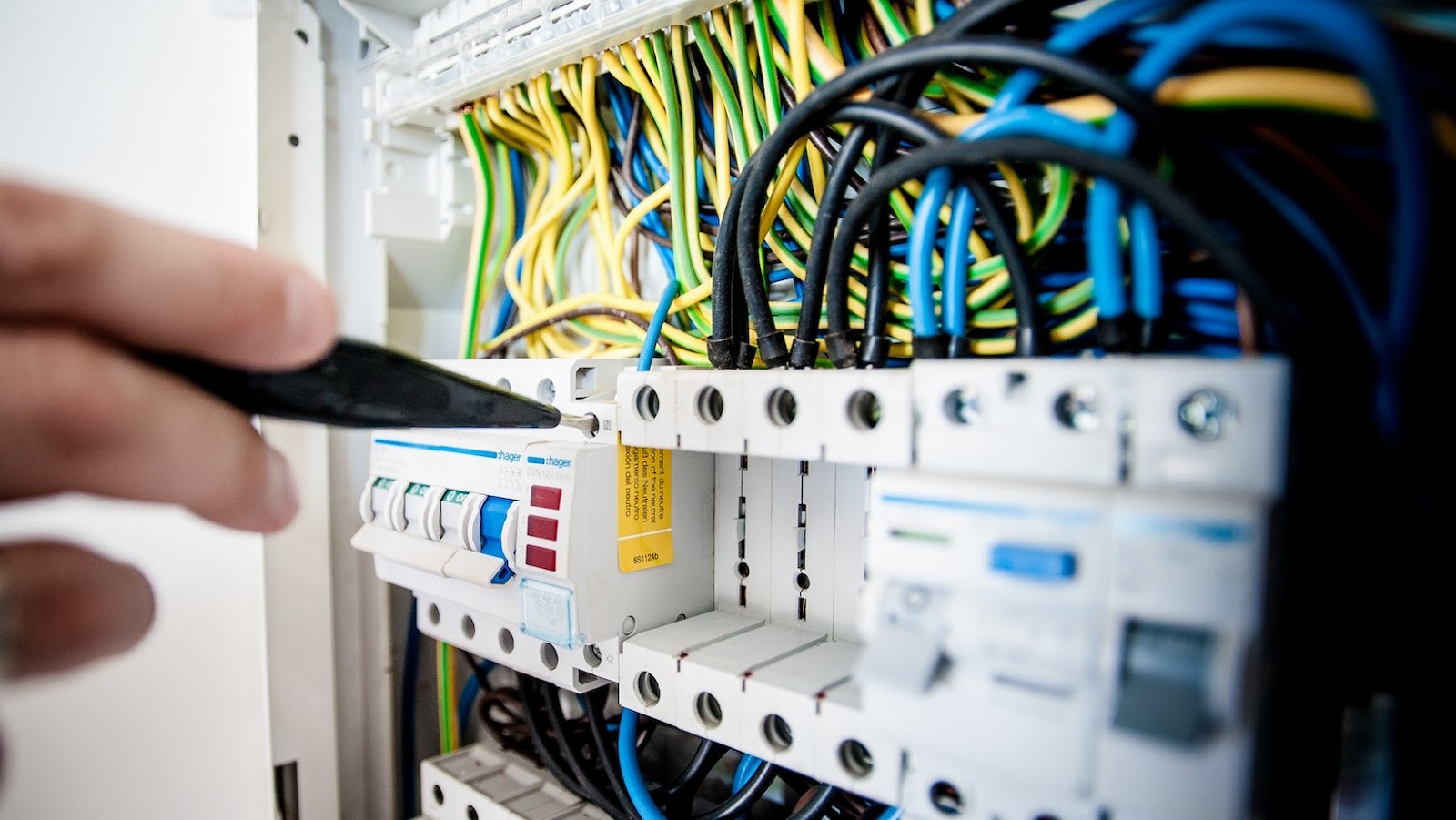5 Common Mistakes People Make With Their Electric Panels

My Houses Electric Panel is in my Bathroom
Having an electric panel in the bathroom can be dangerous if not handled properly. Here are 5 common mistakes people make with their electric panels, especially if it’s located in a bathroom:
1. Installing it in a poor location: As mentioned, having an electric panel in the bathroom poses a risk of electrocution. The panel should be relocated to a safer location outside the bathroom.
2. Not labeling circuits: It’s important to have a properly labeled circuit breaker panel to avoid confusion and ensure that each circuit is serving the intended area.
3. Overloading circuits: Overloading a circuit can cause it to trip, or worse, start a fire. Always distribute the power load evenly and use the right type of circuit breaker for each circuit.
4. Neglecting maintenance: Regular maintenance of your electric panel is important to avoid equipment failure or other issues that could lead to costly repairs or hazards.
5. DIY Repairs: Attempting to repair or troubleshoot your electric panel by yourself can lead to dangerous accidents or damage to the panel itself. Always consult a licensed electrician for any repairs or maintenance.
Lack of Professional Electrician Inspection
Having an electric panel in the bathroom can be dangerous, as there is an added risk of electric shock. It is essential that a professional electrician inspects the wiring and panel in a home before it is used. Failing to do so can lead to significant electrical problems, leading to potential safety issues and costly repairs.
In this article, we will discuss the other common mistakes people make with their electric panels.
Importance of Hiring an Electrician For Inspection
Hiring a professional electrician to inspect your electrical panel is crucial to ensure your safety and prevent common mistakes that can lead to electrical hazards.
Here are five common mistakes that people make with their electric panels:
1. Overloading: Exceeding the panel’s amperage limit can cause overheating and pose a fire hazard.
2. DIY Repairs: Attempting to fix electrical issues without proper knowledge and training can lead to electric shock and fire hazards.
3. Faulty Wiring: Faulty wiring can cause intermittent power outages, damaged appliances or electronics, and electrical fires.
4. Lack of Maintenance: Neglecting routine maintenance can lead to loose connections, damaged wires, and electrical hazards over time.
5. Improper installation: If the electric panel is installed in unsafe locations like the bathroom or close to water sources, it can pose a significant risk of electrical hazards.
Hiring a professional electrician to conduct regular inspections can prevent these mistakes and ensure your electrical systems are safe and up to code.
Risks of DIY Inspection
DIY inspection of your house’s electric panel can be dangerous due to the lack of a professional electrician’s expertise. Here are five common mistakes people make when inspecting their electric panels to avoid electrical hazards.
1. Failing to shut off the power before inspecting the panel.
2. Using improper tools or unsafe equipment that can lead to lethal electrocution.
3. Overloading the panel with too many circuits that can result in electrical fires.
4. Covering or obstructing the electric panel with storage, furniture, or decorations hindering accessibility.
5. Placing an electric panel in a hazardous location, like a bathroom, where there’s a risk of electrical shock or fire due to water exposure.
Remember, dealing with the electrical panel is no joke, better consult a professional electrician to ensure safety and prevent any accidents.
How Frequent Should You Inspect Your Electric Panel
It is recommended to inspect your electric panel at least once a year to ensure that it is functioning properly and safely. Many people fail to have their electric panels inspected by a professional electrician, and this can lead to common mistakes that can be dangerous.
Here are 5 common mistakes people make with their electric panels:
1. Overloading the panel by adding too many circuits or appliances.
2. Using the wrong-sized breakers, which can cause overheating and electrical fires.
3. Not labeling the breakers, making it difficult to identify which circuit controls which area or appliance.
4. Failing to clear debris and clutter around the panel, which can create a safety hazard.
5. Installing the electric panel in inappropriate locations, such as a bathroom or closet, which increases the risk of water damage and shock hazards.
By regularly inspecting your electric panel and avoiding these common mistakes, you can help ensure the safety of your home and family.
Incorrect Panel Location
One of the most common mistakes people make with their electric panels is not locating it in the right place. Installing a panel in a bathroom is a big no-no, as it is not only a safety hazard due to the proximity of water, but it is also illegal in many areas.

In this article, we’ll look at some other common mistakes people make with their electric panel – especially in regards to positioning it, and discuss why it is so important to ensure that your panel is in the right location.
Common Locations of Electric Panels
One of the most common mistakes people make with their electric panels is installing them in unsuitable locations, such as bathrooms, closets, or other enclosed spaces that are not adequately ventilated or easily accessible.
Here are five incorrect locations to avoid when installing an electric panel:
1. Bathrooms or other wet areas – Electric panels should never be installed in areas where water could come in contact with them.
2. Closets or cupboards – Panels require sufficient air circulation to prevent overheating.
3. Basement crawl spaces – Panels should never be installed in areas that are difficult to access, which could impede maintenance or repairs.
4. Outdoor areas with no protection from the elements – Panels should be located in a dry and secure location to avoid damage from weather events.
5. Rooms with flammable materials or chemicals – Electric panels should be kept away from hazardous materials or anything that could cause a fire.
It’s crucial to keep in mind that electric panels play an essential role in your home’s electrical system, and incorrect placement could result in significant hazards. Pro tip: Consult a licensed electrician for guidance on the safest and most appropriate location for your electric panel.
Risks of Installing Electric Panels in Certain Locations
Installing an electric panel in certain locations can pose significant risks to the household and its inhabitants. One of the most common mistakes people make is installing an electric panel in the bathroom. It may seem like a convenient location, but here’s why this can be dangerous:
Bathrooms are considered wet locations, increasing the chances of electrocution due to natural dampness, especially in older homes.
Installing an electric panel in a bathroom may not meet the National Electric Code regulations or any local building codes where the home is located.
If the bathroom is relatively small and near the water supply line, there may be an increased risk of electrical shock or short-circuits that can damage your home’s electrical wiring.
Homeowners must avoid installing the electrical panel in areas where it is exposed to a wet environment and instead choose well-ventilated and dry locations where possible. The danger of electric shock or outage due to exposure to moisture or humidity can quickly be reduced with the help of a professional electrician who can help relocate the panel to a safer location in your home. Pro tip: Never attempt DIY solutions. Always hire licensed electricians to avoid any unwanted incidents.
Solutions to Inappropriate Locations
It is not uncommon for electric panels to be installed in unsuitable or inconvenient locations, such as bathrooms, closets, or crowded corners. Here are some solutions to inappropriate panel locations that can help you avoid safety hazards and comply with electrical code requirements:
- Relocate your panel to a more suitable location with enough space, accessibility, and ventilation. This may require professional help and permits.
- Install a custom-built panel cover or cabinet that matches your interior design and provides more protection and space.
- Create a removable panel access door in a nearby room or hallway that meets the required clearance and accessibility standards.
- Install a remote electrical monitoring system that allows you to check and control your panel from a safe and convenient location.
- Upgrade your panel to a smaller and more compact model that fits your space better without compromising safety or functionality.
Whatever the solution you choose, make sure it is compliant with local building codes and safety standards to avoid costly fines, accidents, and electrical fires.
Using an Outdated Electric Panel
Having an electric panel in your bathroom is not uncommon, however, it is important for this panel to be up to date and working properly. Outdated or damaged electric panels pose a significant risk to your home’s safety, and can even cause a fire.
This article will focus on the 5 most common mistakes people make with their electric panels, and ways to avoid them.
Description of Older Electric Panels
Using an outdated electric panel can pose significant dangers and risks to your home and family. Common mistakes people make when dealing with older electric panels require attention and awareness to ensure the safety of your electrical system.
Here are 5 common mistakes people make with their outdated electric panels:
1. Overloading the electrical system by adding too many appliances or fixtures to a single circuit.
2. Ignoring tripping breakers, which can indicate an underlying issue with the electrical system.
3. Attempting DIY repairs or modifications to the electrical system.
4. Failure to get the panel inspected and upgraded by a licensed electrician.
5. Keeping the electrical panel in a bathroom, which can expose it to moisture and result in electrical shocks, burns, or fires. It is recommended to relocate the panel outside the bathroom or replace the outdated panel with a new, safer one in a safe location.
Risks of Using Older Panels
Using an outdated electric panel can pose significant risks to your home’s electrical system and overall safety. If the electric panel in your home is located in the bathroom, it can create additional hazards.
Here are the risks associated with using older panels:
Overloaded circuits: Older panels may not be able to handle the increased electrical demands of modern appliances and devices, causing overloaded circuits and potential fires.
Electrical shortages: Outdated panels may have degraded wiring, leading to poor connections or electrical shorts that can cause fires or electrocution.
Lack of safety features: Older panels may not have modern safety features like Ground Fault Circuit Interrupters (GFCIs) or Arc Fault Circuit Interrupters (AFCIs), which protect against electrocution and fires.
Difficulty finding replacement parts: If your panel needs repairs, finding replacement parts for older models can be challenging and expensive.
Insurance and resale value: Insurance companies may charge higher premiums or deny coverage altogether for homes with outdated electrical systems. Also, outdated electrical systems can lower your home’s resale value.
If your home’s electric panel is outdated, consider having it upgraded or replaced by a licensed electrician. It’s better to ensure your and your family’s safety than to risk it due to an outdated electrical system.
When to Update an Electric Panel
If your house was built in the 70s, it might still have the original electric panel, which could be outdated and unsafe. Regular maintenance and inspection of your electric panel are necessary to ensure your home’s safety and reduce the risk of electrical hazards.
Here are 5 common mistakes people make with their electric panels:
1) Covering Electric Panels:Covers may interfere with the cooling process of the electric panel, leading to overheating and electrical fires.
2) Lack of regular inspection and maintenance: Regular maintenance reduces oxidation and corrosion, which can cause the electric panel’s failure.
3) DIY installation or repair of an electric panel: Electrical work is dangerous; only a certified electrician should handle installation or repair.
4) Keeping an outdated electric panel: Electrical panels have an average lifespan of 20-25 years. Old panels are a safety hazard and may lead to electrical shocks or fires.
5) Inappropriate location of an electric panel: Some people may have their electric panel installed in their bathroom, this practice creates a dangerous environment.
These mistakes can lead to dangerous outcomes in terms of electrical hazards. One must take proper care of their electric panel and consult an electrician for inspection and repair.
Overloading The Panel
An overloaded electrical panel in the home is a serious safety hazard. This can not only lead to electric fires, but can also cause irreversible damage to the wiring itself. Unfortunately, many people make the mistake of overloading their electric panel, and this is a mistake that can be easily avoided.

In particular, if your house’s electric panel is in your bathroom, it is even more important to be aware of the potential risks of overloading. In the following section, we will discuss the specific dangers associated with overloading your electric panel.
Understanding Electric Panel Capacity
Understanding the electric panel capacity is crucial to avoid overloading the panel and preventing electrical hazards in your home. Many homeowners make these 5 common mistakes with their electric panels:
1. Not upgrading the panel when adding new appliances or electronics to the home.
2. Mislabeling or exceeding the circuits’ amperage limit, leading to a tripped breaker or even a fire hazard.
3. Installing the electric panel in an unsuitable location, such as a bathroom, where moisture can cause damage and corrosion over time.
4. Failing to maintain the electric panel, including regular inspections by a qualified electrician, to ensure it is in good condition and free of issues.
5. Attempting DIY repairs or modifications to the electric panel, which can be dangerous and result in improper wiring or connections.
Pro tip: Ensure that your electric panel is installed in a dry and accessible location in your home, and always consult with a licensed electrician for any repairs, upgrades, or modifications to the panel.
Risks of Overloading an Electric Panel
Overloading an electric panel can lead to several hazards, including short circuits, electrical fires, and damage to appliances.
Here are 5 common mistakes people make with their electric panels:
1. Plugging too many devices into a single outlet.
2. Using multiple power strips that are daisy-chained to one another.
3. Adding new circuits without upgrading the panel or increasing the service capacity.
4. Ignoring the warning signs of an overloaded panel, such as flickering lights or tripped breakers.
5. Installing the electric panel in a damp or unsuitable location, such as a bathroom. It is important to note that the National Electric Code (NEC) has strict guidelines on the placement of electric panels to ensure their safety and longevity. Therefore, if your house’s electric panel is in your bathroom, it is recommended to consult a licensed electrician to assess the situation and take necessary precautions.
Pro tip: It is essential to have a licensed electrician inspect your electric panel regularly and make necessary upgrades or repairs to prevent overloading and hazards.
How to Identify if Your Electric Panel is Overloaded
Identifying an overloaded electric panel is crucial for the safety of your home and family. Here are some signs to look out for:
- Circuit breakers that frequently trip or fuses that frequently blow
Flickering or dimming lights
Buzzing or sizzling sounds coming from the panel or outlets
Discoloration or burn marks around the panel
Burning smell coming from the panel or outlets
To prevent overloading your electric panel, avoid these common mistakes:
1. Adding too many new circuits without upgrading the panel
2. Using too many high-wattage appliances at the same time
3. Using extension cords instead of adding new outlets
4. Ignoring warning signs and not seeking professional help
5. Poorly located panel (like in the bathroom)
Always consult a licensed electrician if you suspect an overloaded panel for your safety and to avoid any electrical mishaps.
Pro tip: It’s best to have your electric panel inspected by a licensed electrician regularly to ensure it is in good condition and functioning properly.
Poor Maintenance of The Electric Panel
The electric panel in a house is an important component that needs to be in good condition and maintained properly. One of the biggest mistakes people make with their electric panel is failing to properly maintain it. Not only can this lead to potential safety hazards, but it can also cause costly repair bills in the future.
Let’s look at five common mistakes that people make with their electric panel and how to avoid them.
Importance of Regular Maintenance
Regular maintenance is crucial when it comes to ensuring the safety and longevity of your electric panel, especially if it is installed in a damp or humid location like a bathroom. Poor maintenance of the electric panel is a common cause of electrical hazards and malfunctions that can lead to electrical fires and damage to your electrical appliances.
Here are 5 common mistakes people make with their electric panels:
- Ignoring warning signs such as burning smells, flickering lights, or tripping breakers.
- Overloading the circuits with too many electrical devices and appliances.
- Using a damaged or worn-out electric panel without getting it repaired or replaced by a certified electrician.
- Ignoring the importance of regular cleaning and maintenance, especially in humid or damp locations.
- Attempting DIY repairs or modifications to the electric panel without proper knowledge or training.
Remember, regular maintenance of your electrical panel extends its life and ensures that it operates safely and effectively, so avoid making these common mistakes and always consult a professional when in doubt.
DIY Maintenance Tips For Electric Panels
Maintaining electric panels is crucial for the safety and longevity of your house’s electrical system. Here are some DIY maintenance tips to ensure the smooth functioning of your electric panels:
- Keep the area around the panel clear and clean, ensuring that there is no clutter, dust, or debris.
- Identify and label circuits on the panel to avoid any confusion when troubleshooting.
- Check for signs of wear and tear, including rust, corrosion, loose connections, and overheating.
- Schedule regular inspections and cleaning to avoid a build-up of dust, dirt, and debris.
- Never place or install an electric panel in a bathroom or near sources of water or moisture. It’s unsafe and against electrical code regulations.
Pro tip: Always seek professional help from a licensed electrician in case of any electric panel related issues to avoid accidents and ensure safety.
When to Call a Professional Electrician For Maintenance
If your house’s electric panel is in your bathroom and you notice any signs of poor maintenance, it’s time to call a professional electrician for help. Here are 5 common mistakes people make with their electric panels that require immediate attention from an expert:
1. Overloading circuits: This can cause breakers to trip and may even start a fire.
2. Using fuses that are either too small or too large for the circuit: This can cause expensive damage to your appliances and circuits.
3. Not grounding the panel: This can cause electrical shocks, electrocution, and even death.
4. Neglecting to upgrade an old electric panel: This can result in insufficient power and a risk of circuit breaker failure.
5. Keeping flammable items around the electric panel: This can increase the risk of a fire.
If you make any of these mistakes or notice signs of poor maintenance, call a licensed electrician immediately to avoid any harm or damage.
Pro tip: Keep your electric panel clean and free from any debris or clutter that can block access or increase the risk of fire.

 The Benefits Of Outdoor Sofa Deep Seating
The Benefits Of Outdoor Sofa Deep Seating  This Method has Been Used for Centuries
This Method has Been Used for Centuries  The Different Types of Bonds
The Different Types of Bonds  Solar Panel Cost And Efficiency
Solar Panel Cost And Efficiency  The Most Comfortable Deep Seating Outdoor Furniture
The Most Comfortable Deep Seating Outdoor Furniture  Maintaining Your Glass Cabinet Doors
Maintaining Your Glass Cabinet Doors